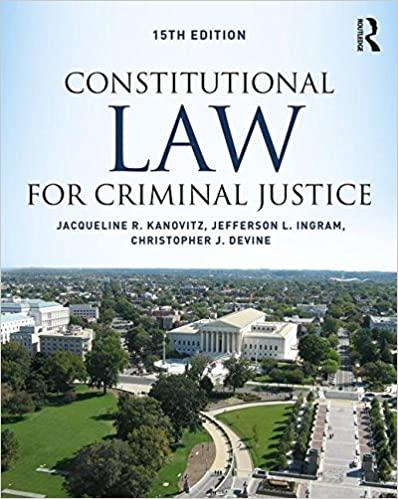Question
Rodriguez v. United States Review both the arguments ofRodriguez and the United States.Acting as the Judge, how would you rule?Why? Be prepared to support your
Rodriguez v. United States
Review both the arguments ofRodriguez and the United States.Acting as the Judge, how would you rule?Why? Be prepared to support your legal position to your classmates.
Facts: Driving along a highway just after midnight, Dennys Rodriguez briefly swerved onto the highway shoulder, which is a violation of the law. Officer Morgan Struble stopped him, questioned him, ran a records check on the car registration and his driver's license, and then gave him a warning ticket. After explaining the warning to Rodriguez and returning the documents to him, Struble asked permission to walk his police dog around Rodriguez's vehicle. Rodriguez said no. On the officer's orders, Rodriguez exited the car. Then Struble walked his dog twice around the vehicle. The dog signaled the presence of drugs. While searching the car, Struble found methamphetamine, an illegal drug. At trial, Rodriguez argued that the dog sniff was illegal for two reasons. First, Struble had conducted a stop and frisk after the traffic stop was over. Second, for a search to be legal, police must have a good reason to suspect a specific criminal activity, which Struble did not have. Both the trial court and the appellate court disagreed with Rodriguez. The Supreme Court granted certiorari (a writ to review a lower court's judgment).
You Be the Judge: Was the dog sniff legal?
Argument for the Government: Officer Struble stopped a car that had swerved onto the shoulder of the highway. Maybe the driver was tired, or drunk, or high on drugs. In any event, Struble had reason to be suspicious. The dog sniff took minutes. That is not an unreasonable burden.
Argument for the Defendant: Officer Struble saw Rodriguez driving dangerously. Stopping the car and running a records check are reasonable ways to protect highway safety. A dog sniff is entirely differentits goal is to detect crime. But the officer had no reason to believe that a crime had been committed. Briefly swerving on a highway after midnight is no evidence of wrongdoing. The police should not be allowed to conduct random searches of cars that have been stopped for a trivial traffic offense.
135 S. Ct. 1609 United States Supreme Court, 2015
Step by Step Solution
There are 3 Steps involved in it
Step: 1

Get Instant Access to Expert-Tailored Solutions
See step-by-step solutions with expert insights and AI powered tools for academic success
Step: 2

Step: 3

Ace Your Homework with AI
Get the answers you need in no time with our AI-driven, step-by-step assistance
Get Started


